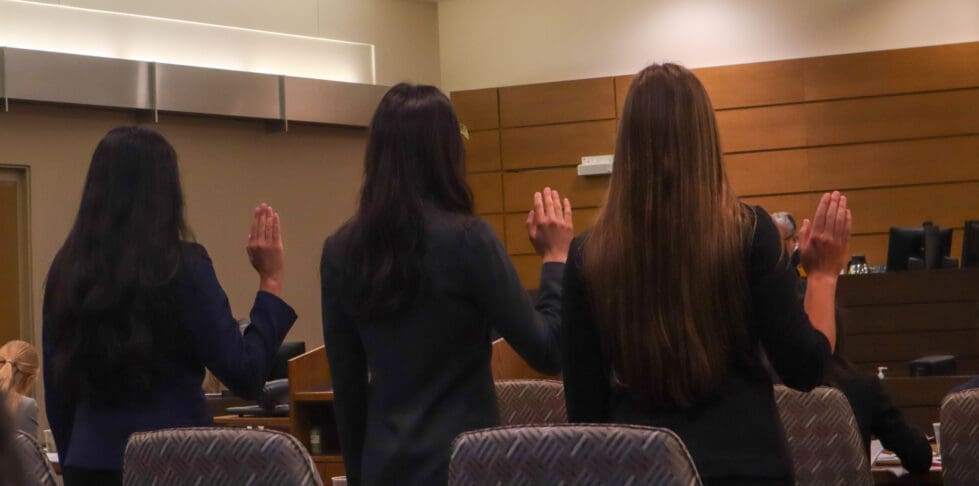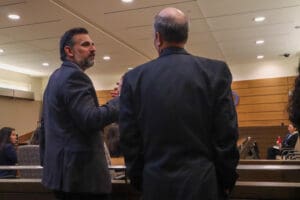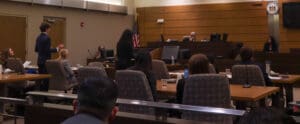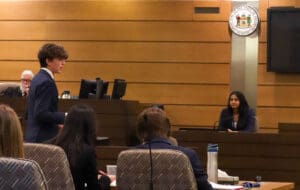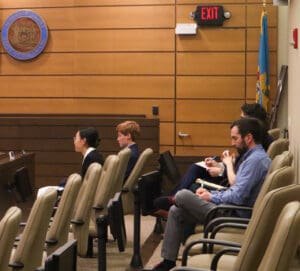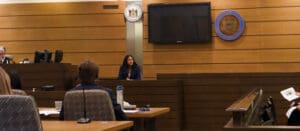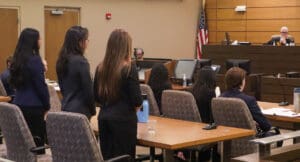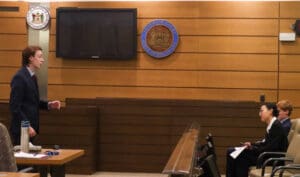
This year’s National High School Mock Trial Championship, hosted in Wilmington, has two teams from Delaware.
Having the 2024 National High School Mock Trial competition in the First State has certainly created a home field advantage for the two Delaware teams competing this weekend.
“I don’t know how many differences there are in the rules, but we are confident that weknow the Delaware rules, which helps a lot,” said Molly Shay, a senior at Newark Charter School, one of two schools representing Delaware in the competition along with the Charter School of Wilmington.
Wilmington Charter won the state championship in February and because the national competition ended up with an odd number of teams, the host state – Delaware – had its runner up, Newark Charter, added.
Shay joked that even little things like not having to stay in a hotel, home-cooking, knowing the layout of the courtrooms and even just knowing where water fountains are gave the two Delaware teams a bit of an advantage.
For just the second time in 33 years, Delaware is hosting the national competition while also having a team compete.
The competition hosts about 48 teams and more than a thousand people from state winners and teams from the Northern Marianas Islands, Guam and South Korea.
“I think it went really well, especially considering we’ve never been to nationals before and we never even placed in the top five before this year,” Shay said after round one of the competition Friday, in which Newark Charter faced the state champs from Alabama.
The team members agreed how hectic it was preparing a case in the span of about a month.
Cassidy Lawhorn, a senior on Newark’s team, added that all the team members are very active outside of school, and she herself was managing her busy softball schedule while preparing for the national competition.
Therese Kim, a senior on the Newark team, said the team has a few months for the state finals, but the national competition specifically releases the trial a month before.
The 40th anniversary of the national competition – taking place at the Leonard L. Williams Justice Center in Wilmington – involves rounds one and two on Friday and rounds three and four on Saturday.
As an ode to Delaware-born-and-raised celebrity Aubrey Plaza, this year’s fictional case involved a dispute over cell phone cases created by a company called QuickPhone.
While the cases are initially popular, partly because the star is, they break down in extreme heat and cause lasting neurologist damage to users, a development that ultimately bankrupts the company.
In the mock case, a group of the actress’s fans and investors allege she did not in fact run the company, misleading them into buying stock, and that her recklessness as CEO led to the failure of the company, costing them millions.
Along with witnesses, defense and prosecution attorneys and timekeepers, there was in fact a student playing the role of Plaza.
Shay and her counterpart were sharp – quickly throwing out about two dozen objections to the judge while citing code in Delaware courtroom rules.
The presiding judge – Christopher McFadden from the Court of Appeals of Georgia – rejected all, giving the students his reasoning in the first round, which lasted a little over two hours.
The courtroom procedures were consistent with actual trials, with everyone rising when the judge entered, the judge asking both sides if they had any objections to the audience taking photos or videos, a police officer standing on the side of the witness stand and more.
Shay – who acted as lead counsel for Newark’s team, which was the prosecution – would make any fan of Better Call Saul proud with her wit, knowledge of the law and quick responses.
In the closing arguments, she even left exactly 34 seconds of her five minutes to rebuttal the defense’s closing argument (which used all of its time).
In the 34 seconds, she ate up the defense’s closing argument, which was focused on how Plaza was “risky” which is needed in business.
Repeating the same cadence about six times, Shay would state a fact of the case and then end it by saying that Plaza was not “risky,” she was “reckless.”
The second the round ended, the two teams ran over to each other in camaraderie, shaking hands and playfully apologizing for some of the mean words they spoke in character.
“It was a great first round, both teams did amazing,” Lawhorn said. “The preparation of both teams was extensive and I’m very very proud of everything that everyone put together.”
Each year, students will argue a civil or criminal matter and will not “win” or “lose” the case, but will be judged on their presentation, knowledge of the law and skill in the courtroom.
Brent Freccia, a social studies teacher at Newark and team coach, said what he’s most proud of is how hard his team has worked over the course of the year.
“Not just for getting here, but also over the last month they’ve had AP exams, we’ve had people being torn away for spring sports, we’ve had people going away for scholarship opportunities, for college visits, college decisions and all sorts of other competitions,” he said, “so the mere fact that they were able to pull everything together and be as successful as they are is amazing to me as a teacher.”
The students play the same role in each round based on their strengths and what they’re comfortable with.
Lawhorn pointed out there’s usually three different types of witnesses: defendant witnesses, character witnesses and expert witnesses.
She’s in her third year of mock trial competition and Shay is in her fourth.
Freccia also acknowledged the amazing opportunity his team was afforded that wouldn’t have been possible if Delaware was not hosting the national competition this year.
Someone in the audience might feel like some of the trial is “scripted” – which it is, in a way.
For example, a witness for the prosecution was presented with a testing exhibit from the prosecution and asked if the exhibit is accurate.
The witness says “yes” and the prosecution proceeds with questioning.
If the witness were to say “no,” that would throw the trial off.
“That’s actually in the stipulations, that they’re all accurate and happened,” Shay said. “So you could object and say ‘Your Honor, this is within the stipulations of evidence,’ so basically, they couldn’t say “no”, because if they said “no” we’d be like ‘That’s not right!’.”
Wilmington Charter faced off with Maine’s state winner. The team was not available for interviews Friday.
The final two teams will compete in the championship round that will be presided over by three Delaware Supreme Court Justices, and the winner will be announced at about 7:45 p.m., along with awards and other honors, at a ceremony and dinner at the Chase Center on the Riverfront.

Raised in Doylestown, Pennsylvania, Jarek earned a B.A. in journalism and a B.A. in political science from Temple University in 2021. After running CNN’s Michael Smerconish’s YouTube channel, Jarek became a reporter for the Bucks County Herald before joining Delaware LIVE News.
Jarek can be reached by email at [email protected] or by phone at (215) 450-9982. Follow him on Twitter @jarekrutz
Share this Post


